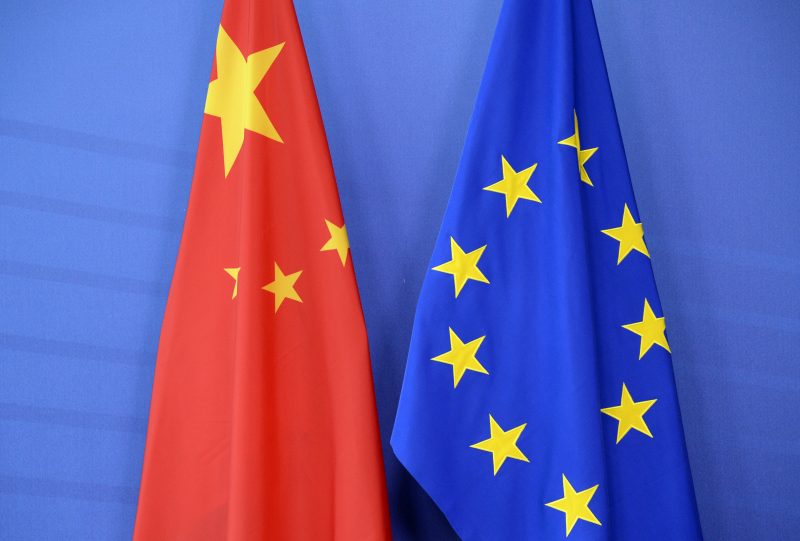Tall hurdles as Europe looks to close ranks on China
China’s push deep into Europe has sounded alarm bells among some of the bloc’s leaders (THIERRY CHARLIER)
Paris (AFP) – Europe’s top leaders tried to project a united front when they met China’s Xi Jinping, but their desire to push back against Beijing could prove difficult to put into practice, analysts say.
Tuesday’s joint meeting in Paris between Xi and Emmanuel Macron, Angela Merkel and EU Commission president Jean-Claude Juncker was an innovation of sorts.
Xi usually prefers bilateral talks, but host Macron, a fervent pro-European, was intent on sending a message: that EU leaders were stronger together.
With Xi sat next to him at a press conference, the 41-year-old French leader pointedly reminded his Chinese visitor that “we expect our major partners to respect the unity of the European Union.”
Steven Blockmans, a foreign policy expert at the Centre for European Policy Studies in Brussels, told AFP that the meeting should be seen as part of EU efforts to be more assertive.
“There is a feeling that member states need to come together in unison to be able to stand up to China,” he said.
The change has been sparked in large part by concerns about China’s “Belt and Road” infrastructure venture, also known as the “New Silk Road”, which has seen Beijing disperse billions of dollars on investments abroad.
The idea is to improve infrastructure to link Chinese manufacturers in the east to European consumers in the west along a route of around 60 countries.
But China’s push deep into Europe, where it has snapped up strategic assets such as ports and promised lucrative contracts for some of the bloc’s cash-strapped economies, has sounded alarm bells.
Days before Xi’s visit, the European Commission released a sharply worded plan for balancing ties with China, warning that Beijing was a “systemic rival” as well as the bloc’s biggest trading partner.
The list of European grievances is long.
The Commission raised the long-standing problem of forced technology transfers, in which European companies must transfer technology to China to win contracts.
It also outlined issues such as Chinese subsidies for its industrial companies, which distort global competition, as well as the closed public procurement market in China.
European officials have long chafed at the bloc’s huge trade deficit with Beijing — it imported 375 billion euros of goods in 2017 while exporting just 198 billion euros.
There is also mounting anxiety about cybersecurity, particularly over new 5G mobile phone technology from China’s Huawei that the US has warned could be used for spying.
“In my opinion, this is the beginning of a long-term adjustment of EU-China relations,” said Alice Ekman, head of China studies at the French Institute of International Relations.
– ‘Being realistic’ –
Both Macron and Merkel insisted Tuesday on the need for “reciprocity” in relations with China and a level playing field regarding trade and business ventures.
Last month, EU lawmakers voted in new methods for screening foreign investments in Europe which will limit China’s ability to buy firms in the strategic technology and infrastructure sectors.
And last week, European leaders devoted time during a meeting in Brussels to discuss their policies towards China — a rare step that many observers saw as a belated awakening to the risks.
“I really think that Europe is getting its act together,” said Philippe Le Corre, a senior fellow at the Carnegie Endowment for International Peace.
This will be put to the test next month when Chinese Prime Minister Li Keqiang touches down in Brussels for another summit with EU leaders.
– ‘Carrot and stick’ –
But the problem for leaders such as Macron who want to see a more coordinated EU strategy is individual members states pursuing narrower national interests.
“Overall there is a very fractured, fragmented approach by EU member states vis-a-vis China, at a bilateral and regional level,” Blockmans said.
He says members states have “old habits of trying to strike the best deal they can with this rising superpower.”
One flagrant example was Italy’s decision to sign up to Beijing’s “New Silk Road” infrastructure initiative last week — despite scowls of disapproval from its EU partners.
And while Xi praised multilateralism and EU cooperation during his five-day visit to Italy, Monaco and France, few expect China to change course in how it deals with the EU.
“They like talking to countries individually — it’s not so different from (US President) Donald Trump — and they’ve been shaping EU-China relations in that way,” said Le Corre.
Just days after the EU-China summit on April 9, Croatia will hold this year’s meeting of the so-called “16+1” forum of Central and European countries, which was formed by China.
Many European officials believe it is designed to split the EU.
Of the 16 countries which have partnered with Beijing in the forum, 11 are EU members.
Disclaimer: This story is published from a syndicated feed. Siliconeer does not assume any liability for the above story. Validity of the above story is for 7 Days from original date of publishing. Content copyright AFP.


